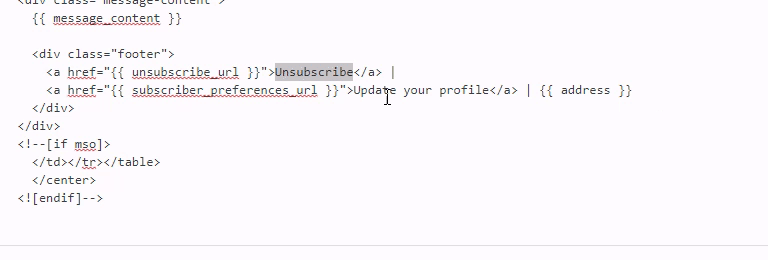
Unsubscribe tags (or links) are a way to help you keep your email list clean, healthy, and up-to-date. It also helps you stay compliant with the CAN-SPAM Act and the GDPR policy.
What is an Unsubscribe Link or Tag & What are the Benefits of Email Marketing Campaigns?
An unsubscribe tag is a way to determine when someone has opted out of your email list. It is usually placed at the bottom of each email campaign and it can be manually or automatically inserted into your emails.
The benefits are that it allows you to build a better relationship with customers by providing them with an easy way to opt out of future emails, while also staying compliant with the CAN-SPAM act which keeps you from getting fined for spamming people who have opted out of your campaign.
How to Insert an Unsubscribe Tag in Your Emails
Having unsubscribe tags in your emails is a way to allow subscribers to remove themselves from your email list. This is done by adding an unsubscribe button or link that will take the user to a page where they can cancel their subscription.
They should be included at the bottom of each email, and it should be easy for the user to find. If you are using a newsletter service, then the it may be included as part of that service.
In order for this button/link to work properly, it needs to have an “unsubscribe” word or phrase in it so that when people search for this word or phrase on their email account, they will find this link and thus remove themselves from your list.
Best Practices for Designing and Using an Effective Tag
When it comes to email marketing, unsubscribing from a list is a major issue. Some email marketing platforms have been trying to solve this problem by developing unsubscription tags that display at the bottom of the email.
The unsubscription tags are designed to help customers easily and quickly unsubscribe from an email list. The tags are also meant to improve customer experience by giving them more control over their inboxes. Moreover, direct tags help to maintain your sender’s reputation high and trustworthy.
Some platforms have been using this feature for years, while others are still in the beta testing phase. These features can be found in both free and paid versions of the software, but they do not work on all types of devices or operating systems.
Unsubscribe Tags and Links List
Below you will find complete unsubscribe tags and HTML codes for the most commonly-used platforms on the web.
SAAS
MailChimp unsubscribe
*|UNSUB|*HTML Code for Mailchimp unsubscribe:
<a href="*|UNSUB|*">Unsubscribe from this list.</a>Sendgrid unsubscribe
{{{unsubscribe}}}HTML Code for Sendgrid unsubscribe:
<a href="{{{unsubscribe}}}">Unsubscribe from this list.</a>Brevo (SendinBlue) unsubscribe
{{{unsubscribe}}}HTML Code for Brevo (Sendinblue) unsubscribe:
<a href="{{{unsubscribe}}}">Unsubscribe from this list.</a>Unisender unsubscribe (formerly Selzy)
{{UnsubscribeUrl}}HTML Code for Unisender (Selzy) unsubscribe:
<a href="{{UnsubscribeUrl}}">Unsubscribe from this list.</a>Mailer Lite unsubscribe
{$unsubscribe}HTML Code for Mailer Lite unsubscribe:
<a href="{$unsubscribe}">Unsubscribe from this list.</a>Constant Contact unsubscribe (embedded)
${unsubscribe}HTML Code for Constant Contact unsubscribe:
<a href="${unsubscribe}">Unsubscribe from this list.</a>ConvertKit unsubscribe
{{ unsubscribe_url }}HTML Code for ConvertKit unsubscribe:
<a href="{{ unsubscribe_url }}">Unsubscribe from this list.</a>ActiveCampaign unsubscribe (embedded)
%UNSUBSCRIBELINK%HTML Code for ActiveCampaign unsubscribe:
<a href="{{ unsubscribe_url }}">Unsubscribe from this list.</a>GetResponse unsubscribe
{{LINK `unsubscribe`}}HTML Code for GetResponse unsubscribe:
<a href="{{LINK `unsubscribe`}}pt=unsubscribe">Unsubscribe from this list.</a>MailGun unsubscribe
%unsubscribe_url% (for the entire domain) or %tag_unsubscribe_url% (for just emails with this tag, less usual to use this tag)HTML Code for Mailgun unsubscribe:
<a href="%unsubscribe_url%">Unsubscribe from this list.</a>AWeber unsubscribe
{{ subscriber.unsubscribe_link }}HTML Code for AWeber unsubscribe:
<a href="{{ subscriber.unsubscribe_link }}">Unsubscribe from this list.</a>Zoho unsubscribe
$[LI:UNSUBSCRIBE]$HTML Code for Zoho unsubscribe:
<a href="$[LI:UNSUBSCRIBE]$ ">Unsubscribe from this list.</a>Flodesk unsubscribe
{{ subscriber.unsubscribeUrl }}HTML Code for Flodesk unsubscribe:
<a href="{{ subscriber.unsubscribeUrl }}">Unsubscribe from this list.</a>Mailjet unsubscribe
[[UNSUB_LINK_LOCALE]] or [[UNSUB_LINK_FR]] (for smtp relay)HTML Code for Mailjet unsubscribe:
<a href="[[UNSUB_LINK_LOCALE]]">Unsubscribe from this list.</a>Pradot unsubscribe (Salesforce)
{{Unsubscribe}}HTML Code for Pradot unsubscribe:
<a href="{{Unsubscribe}}">Unsubscribe from this list.</a>Salesforce Marketing Cloud unsubscribe
%%profile_center_url%%
HTML Code for Salesforce Marketing Cloud unsubscribe:
<a href=”%%profile_center_url%%”>Unsubscribe from this list.</a>
Elasticemail unsubscribe
{unsubscribe}HTML Code for Elasticemail unsubscribe:
<a href="{{Unsubscribe}}">Unsubscribe from this list.</a>Ongage unsubscribe
{{unsubscribe}}HTML Code for Ongage unsubscribe:
<a href="{{unsubscribe}}">Unsubscribe from this list.</a>Pepipost unsubscribe
[UNSUB] or [UNSUBSCRIBEURL]HTML Code for Pepipost unsubscribe:
<a href="[UNSUB]">Unsubscribe from this list.</a>Newsman unsubscribe
##NEWSMAN:unsubscribe##HTML Code for Newsman unsubscribe:
<a href="##NEWSMAN:unsubscribe##">Unsubscribe from this list.</a>Sabarcane unsubscribe
{{unsubscribe}}HTML Code for Sarbacane unsubscribe:
<a href="{{unsubscribe}}">Unsubscribe from this list.</a>Mail250 unsubscribe
[UNSUBSCRIBEURL]HTML Code for Mail250 unsubscribe:
<a href="[UNSUBSCRIBEURL]">Unsubscribe from this list.</a>OneSignal unsubscribe
[unsubscribe_url]HTML Code for OneSignal unsubscribe:
<a href="[unsubscribe_url]">Unsubscribe from this list.</a>WoodPecker unsubscribe
{{UNSUBSCRIBE}} HTML Code for WoodPecker unsubscribe:
<a href="{{UNSUBSCRIBE}}">Unsubscribe from this list.</a>Emarsys unsubscribe
Emarsys has an embedded unsubscribe tag system. But you can do the following:
List-Unsubscribe: <mailto:list-unsubscribe-stage+2188885_1039207_196YmQy0K@emarsys.net>, <https://list-unsubscribe-stage.eservice.emarsys.com/api/unsubscribe/2483458851456063207196YmQy0K>Dotmailer unsubscribe (dotdigital)
Dotdigital has an embedded unsubscribe tag system
SparkPost unsubscribe
Sparkpost has an embedded unsubscribe system
Hubspot unsubscribe (embedded, they don’t have)
Hubspot CRM has an embedded unsubscribe tag system
MailKitchen unsubscribe (embedded)
Mailkitchen has an embedded unsubscribe tag system
Bronto unsubscribe (Oracle NetSuite)
Bronto email platform closed down on May 31st, 2022
Self-Hosted
Mailwizz unsubscribe
[UNSUBSCRIBE_URL] (most commonly) OR [DIRECT_UNSUBSCRIBE_URL]HTML Code for Mailwizz unsubscribe:
<a href="[UNSUBSCRIBE_URL]">Unsubscribe from this list.</a>Mautic unsubscribe
{unsubscribe_url}HTML Code for Mautic unsubscribe:
<a href="{unsubscribe_url}">Unsubscribe from this list.</a>Mumara unsubscribe
%%unsubscribelink%%HTML Code for Mumara unsubscribe:
<a href="%%unsubscribelink%%">Unsubscribe from this list.</a>Sendy unsubscribe
[unsubscribe]HTML Code for Sendy unsubscribe:
<a href="[unsubscribe]">Unsubscribe from this list.</a>WordPress
Mailpoet unsubscribe
'.$unsubscribeUrl.'HTML Code for Mailpoet unsubscribe:
<a href="'.$unsubscribeUrl.'">Unsubscribe from this list.</a>Shopify
Klaviyo unsubscribe
{% unsubscribe %}HTML Code for Klaviyo unsubscribe:
<a href="{% unsubscribe %}">Unsubscribe from this list.</a>Generate unsubscribe code in PHP
In PHP, things are more technical. In order to generate a link, the developer needs to create a script for this:
<?
$link = "unsubscribe.php?id=$user['id']&validation_hash=".md5($user['id'].$SECRET_STRING)
<a href="<?=$link?>">Unsubscribe</a>After that, you can proceed with script processing:
function unsubscribe() {
$expected = md5( $user['id'] . $SECRET_STRING );
if( $_GET['validation_hash'] != $expected )
throw new Exception("Validation failed.");
sql("UPDATE users SET wants_newsletter = FALSE WHERE id = " . escape($_GET['id']);
}Final Word: Do Not Forget To Put An Unsubscribe Tag Before Sending
Email marketing campaigns have been around for decades, and in that time, they’ve become an essential part of any company’s marketing strategy.
Over the years, email marketing has evolved to account for new technologies and trends. In the past few years, we’ve seen a surge in email marketing campaigns that use automation to send out personalized messages to subscribers based on their behavior or preferences. The result is a more personal customer experience with less of a chance of coming across as spam and your unsubscribe tag will be converted to a real unsubscribe link when you send out your campaign.
However, email marketing is still at risk of being criticized as spam by recipients if it’s not done correctly. One way to avoid this is by using an effective unsubscription service that makes it easy for your customers to unsubscribe from your emails without having to search through your website or contact support.






